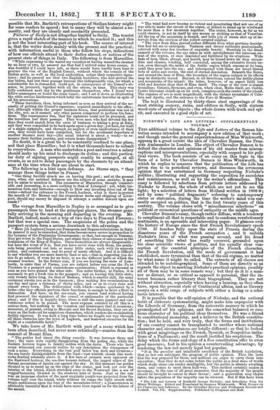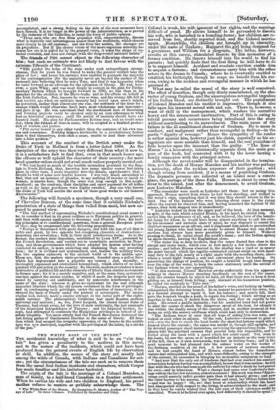NIEBIIHR'S LIFE AND LETTERS : SUPPLEMENTARY VOLUME.'
THIS additional volume to the Life and Letters of the Roman his- torian seems intended to accompany a new edition of that work ; and though under the general superintendence of Miss Winkworth, appear; to a great extent the idea of Chevalier Bunsen, the Prus- sian Ambassador in London. The object of Chevalier Bunsen is to defend the character and opinions of his old master from miscon- ceptions and misrepresentations, especially with respect to his poli- tical views. The book consists of an essay on this topic in the form of a letter by Chevalier Bunsen to Miss Winkworth, in which he replies to censures that the publication of the Life has given rise to in periodical reviews, and discusses the erroneous opinion that was entertained in Germany respecting Niebuhr's politics ; illustrating and supporting the exposition by anecdotes and reminiscences, as well as by the writer's affirmations. This essay is followed by selections from private letters addressed by Niebuhr to Bunsen, the whole of which are not yet to see the light; by a selection of letters from Holland written in 1808-9 ; and by some " political fragments" referring to contemporary states or statesmen, during the time the writer's mind was ear- nestly occupied on politics, that is the first twenty years of this century. The volume closes with " miscellaneous selections " on political or economical questions of antiquity or the middle ages.
Chevalier Bunsen's essay, though rather diffuse, with a tendency to compliment all that is respectable and to condemn revolutionary sentiments, is an agreeable and interesting paper. It glances over the history of Europe since the first French Revolutionary epoch 1789. It touches fully upon the state of Prussia during the disastrous years of the French occupation ; and it unfolds Niebuhr's ideas of what was passing around, and his dread of something like what has really occurred, grounded upon his clear scientific views of politics, and his equally clear con- ception of the essential principles of the French character, the French Revolution, and the mode of government it had established, more tyrannical than that of the old regime, no matter by what name it might be called. The extracts of all classes are intended to be autobiographical. Some of them are directly so as regards the object in marking Niebuhr's practical opinions, possibly all of them may be in some remote way ; but they do it in a man- ner so distant, or so critical as opposed to personal, that the in- terest becomes rather literary than biographical. They are not without attraction, especially when having a bearing, as they often have, upon the present state of Continental affairs, and as literary essays on a wide range of subjects with either a living or a scho- lastic interest.
It is possible that the self-opinion of Niebuhr, and the national habit of elaborate systematizing, might make him unpopular with the Liberals of Germany,. from the autocratic manner in which he promulgated all his opinions, and the somewhat balanced or cau- tious character of his political ideas themselves. He was a friend to constitutional monarchy, and a believer in the British constitu- tion; but he held, and very truly, that the forms and institutions of one country cannot be transplanted to another whose national character and circumstances are totally different : so that he looked with great misgivings on the French, Spanish, or Neapolitan imita- tions of a Parliament ; and the result justified his scepticism. The delay which the forms and clogs of a free constitution offer to even good measures, had in his opinion a countervailing advantage, by rendering the law not merely legal but popular.
"It is the peculiar and inimitable excellence of the British legislation, that no law can anticipate the progress of public opinion. Thus the laws find the way prepared for them, and millions are eager to carry them into execution ; thus they do not come before the public as a dead mass of words which study alone can render intelligible, but the public is already awaiting them, and comes to meet them half-way. This method certainly makes it necessary, in the case of all great measures, that the majority of the people should be brought to concur in their favour ; and a generation may elapse before the prejudices of the majority can be silenced. But if this have been
• The Life and Letters of Barthold George Niebuhr, and Selections from his Minor Writings. Edited and Translated by Susanna Winkworth. With Essays on his Character and Influence. By the Chevalier Bunsen and Professors Brandis and Loebell. Vol. III. Supplementary. Published by Chapman and Hall. accomplished, aid; a strew feeling on the lade of the new mewiums have been farmed, itis no longerin the power of the Administration, as is proved by the instance of the Catholics„ to resist the force-of public opinion. 'Time men who are free from prejudice will, unquestionably, discern what is desirable and advantageous sooner than the multitude, which cleaves more closely toile old customs; and the freer the nation, the stronger are its prejudices. Hut if the dearer vision of the more saga,cioua wiper*, be? comes law ere it is called for by the geuaral voice, it tali% the Amp° of ex.- ternal resi int-0xnd does not mingle with the deep-routed national habits."
The friends of Pitt cannot object to the following character of him • hut eaoh anestimate was not likely to find favour with the extreme Triberalis of the Continent "Fitt guided the helm of the state tinder such extraordinary circum- stances, that for years he was forced to make the general welfare take the place of law ; and hence his enemies were enabled to persuade the majority of his contemporaries for the majority never see beyond the surface of the moment) into believing that he was a Tory, -and that it was hypocrisy when he came forward as an advocate for the extension of liberty. He e was, how- ever, a pure Whig; and was most deeply in earnest in the plan for Parlia- mentary Reform which he brought forward in /784, no less than in his cpeeches for the abolition of the Slave-trade, and in his efforts on behalf of the Irish Catholics. But, because he was so wise, and his stormy life fell in that terrible age when an epidemic insanity had seized upon men's minds, he perceived, .earlier than almost any one else, the unfitness of the time for a ehange which would otherwise have been. most wholesome and innocent— and gave it up. He was convinced that the daeabinical love of theorising and forming projects could be checked only by an iron adherence to what had an historical existence ; untiil the period of insanity should have ex- hausted itself. His plan for Parliamentary Reform may, and no doubt some day, when -thefulnesa ef.-time is come, will be adopted BB a finished produc- tion of wisdom and justice. "Pitt never bowed to any other verdict than the sentenee of his ownsea- eon and conscience. Nothing is more intolerable to a revolutionary faction than to find themselves, from such a-muse, unable-to lead their adversary into &false position."
This account of the eondaet of the British army under the Duke of York in Holland is from a letter -dated 1808. As the discipline of the army was thenvery different from what it now is, it is a satisfactory fact to find that, even in that much looser age, the officers so well upheld the character of their country ; for mere head-quarter orders could not avail muoh unless properly carried out.
" We had heard so much of -the terrible enormities practised by the Eng- lish in North Holland, that, knowing how many similar scenes had taken place in other wars, I made inquiries into the, details, apprehensive that I should be told of some new fearful horrors. I was very much astonished to find, that not an-instance of plunder, to say nothing of murder or insult to women, is known here, though the army was long enough in this neigh- boushoed ; on the contrary,their discipline and exact payment for all trifles as' well as for large purchases were highly extolled. Any one who knows `the Luke of Yark.mill ascribe the merit of thesegood works to old General Abercrombie."
The following will furnish a specimen,.though a- very small one, of Chevalier Bunsen, at the same time that it exhibits Niebnlir's. penetration of a state of things then veiled from. mast, but now ex- posed to general view.
"The best method of representing Niebuhr's constitutional creed seems to he, to consider-it -first in its great outlines as to European politics in general, and then with special application to Germany and Prussia. 'Now, his lead- ing principle& as-to constitutional questions, from a general European point of view, may be compressed into the following prepositions.
" Europe is threatened great dangers,. and with the loss of all that is noble and great, by two opposite but conspiring elements of destruction— despotism and revolution; both in their most nnschievous forms. As to the
Sumer, the modern state despotism, established by Louis promoted by the French Revolution, and carried out to unenviable perfection by Napo- leon,' and those governments which have adopted his -system after having combated its author, is more enslaving and deadening than any preceding form ; for it is civilized and systematized, and, besides the milita force, has two engines unknown to the ancient world or to the middle ages. These are' first, the modern state-government, founded upon a police force which has degenerated into a gigantic spy systemand, secondly, a thoroughly organized and centralized bureaucracy, whilh allows of no mde- pendent willamd action in the country. So, likewise, modern revolution is more destructive of political life andthe elements of liberty than similar movements in former ages ; for it is a merely negative, and, at the same time, systematic reaction against the ancien regime, of which it made the despotic part uni- versal by carrying. out uniformity, and by autocratic interference in the name of the state,; whereas it gives no equivalent for the real although imperfect liberties which the old system contained in the form of privileges; and in condemning such privileges under the sanction of democracy, it de- stroyed the basis of liberty under the pretext of sovereignty. The ancien regime had, indeed, made a similar attempt in the latter part of the eight- eenth century. The philosophical Catherine had insole Russian serfdom universal and uniform ; so, too, Peter Leopold, the liberal Grand Duke of Tuscany, had swept away,,for the love of state uniformity, the last remnants of the municipal independence of Tuscany ; and his Imperial brother, Jo- seph, had attemptedlo confiscate the privileges in behoof of ab- solute kingship. Yet more utterly 'had the French Revolution destroyed-the last.living germs of Continental liberties in the name of liberty. All free- dom which had-escaped the irregular oppression of the barons in the middle ages was now destroyed„tog,ether with.the privilegeaof the latter, lay a stroke
of the pen."



























 Previous page
Previous page